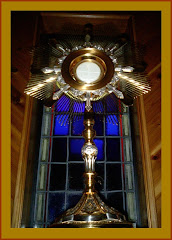
The Homily You Probably Didn’t Hear Today
The Feast of the Annunciation is exactly nine months before the Nativity on the Church calendar. Though Christ was not actually born on December 25, we faithfully commemorate Gabriel’s announcement and Mary’s Fiat according to human gestational calculation.
If Catholic clergy were not adamantly ignoring the elephant in the living room, topical sermons would write themselves for this day. But the obvious is too "abrasive" and "polarizing" to ensure the faux unity they seek to maintain...
So you most likely did not hear what Christians need to hear in order to live the full Gospel and defend pre-born humanity.
God became man. When did this INCARNATION happen? At Christmas? The explanation was given to Mary: "The Holy Spirit will come upon you and the power of the Most High will cover you with its shadow." God-man did not come into the world as an adult, nor did Mary produce him as a fully formed infant at Bethlehem. God’s inception in human form happened when Mary said: "I am the handmaid of the Lord, let what you have said be done to me."
Gabriel further conveyed the news of another miracle in order to illustrate God’s power and facilitate Mary’s belief in it. Cousin Elizabeth, who was thought to be barren, conceived in her old age, for nothing is impossible to God. Not only does this other announcement of pregnancy focus attention on conception; it propels Mary to visit her cousin, which then results in the interaction between mothers and their respective children in utero.
John 1:14 tells us
"The Word was made flesh,
he lived among us,
and we saw his glory..."
The Greek words are far more descriptive than vernacular translations provided for us would lead us to believe. Furthermore, a lifetime of repetition tends to alter each successive attempt at comprehension and digestion. SARX can indeed be translated as flesh but a more concrete, less poetic, reading of the word is meat. God became meat and tented among us lends a more visceral description to events, don’t you agree? When we then see His Glory, it is his DOXA, in its full Majesty.
God’s Incarnation then – His becoming meat – happened at a moment in time in physical reality. A one-celled morsel came into existence and grew. We understand this process from a scientific perspective better now than at any time in man’s history. You have to ask yourself why extreme efforts are made to avoid routine explanation of human embryological development as it pertains to the physical origins of our personal Savior, Jesus Christ – the Word who became flesh.
















No comments:
Post a Comment